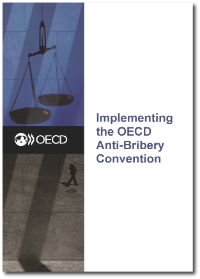Bribery in international business
Israel - OECD Anti-Bribery Convention
|
Monitoring and evaluation
|
Israel's accession11 March 2009 15 February 1999 21 July 2008 |
|
|
Monitoring and peer review history
2017 Follow-up to Phase 3 report 2015 Phase 3 report 2012 Follow up on Phase 2 report 2009 Phase 2 report 2009 Phase 1 report News releases
2009 Israel joins OECD Anti-bribery Convention 2009
|
The OECD Anti-Bribery ConventionThe OECD Anti-Bribery Convention establishes standards to criminalise bribery of foreign public officials in international business transactions. Full text and related documents
OECD Working Group on BriberyThe OECD Working Group on Bribery in International Business Transactions is responsible for monitoring the implementation and enforcement of the OECD Anti-Bribery Convention, the 2021 Recommendation and related instruments. The Working Group is made up of representatives from the States Parties to the Convention and meets regularly. Learn more about the Working Group Monitoring and evaluationMonitoring of implementation and enforcement of the OECD Anti-Bribery Convention takes places in successive phases through a rigorous peer-review monitoring system.
|
Related Documents
